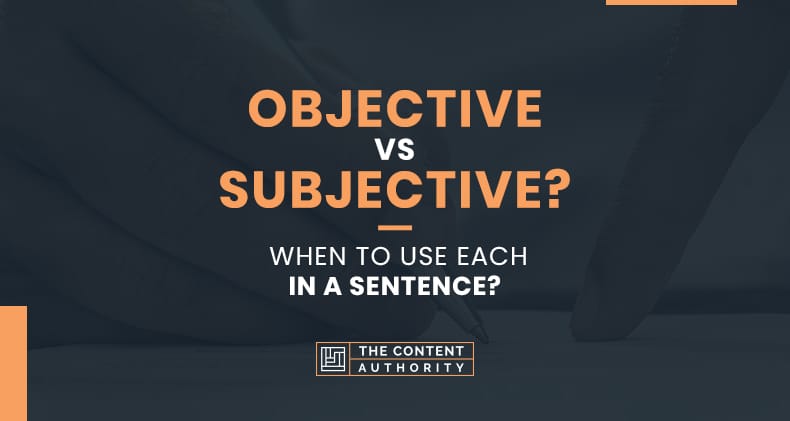Some words have the tendency of possessing a similar sound and sometimes share a syllable or two. This common ground between words welcomes confusion and at times requires some form of explanation and separation. Words like “objective” and “subjective”, are part of that group. Here we will go over their differences and how to use them correctly in a sentence.
The word “objective” is when used as an adjective it means to be uninfluenced by personal feelings or opinions, considering the facts. The word “subjective” , means the exact opposite as “objective”, we will use it to refer to someone heavily influenced by personal feelings and opinions, completely biased.
As we move forward in the article we will explore the origin and meaning of these words and we will provide examples and more details to keep present when using these words in different contexts.

Objective: Definition
The word “objective” is defined as an unbiased and true balanced statement that represents facts about something or someone. When a statement is said and it is not colored by personal experiences, and it is free from assumptions, prejudices, perceptions, and desires, or knowledge of the truth, it is said to be “objective”.
The word “objective” can be used both as an adjective and as a noun. In the adjective form it stands for the definition provided above. However, when the word “objective” is used as a noun it refers to a goal, a pursuit in life that a person seeks to achieve. This could be of personal nature, academic, work related or even romantic.
The word “objective” also has a place in grammar rules, when speaking of “Objective Pronouns”. Which act as the object of a sentence, these receive the action offered by the verb in a sentence.
Subjective: Definition
We define “subjective” as a personal or emotional response to an event. Using “subjective” as an adjective is when you get to be influenced by personal emotions and beliefs in decision making or opinion regardless of facts the main drive is of a personal source .
Using the word “subjective” as a noun is a lack of freedom of action or belonging to an independent mind.
When using the word “subjective” one makes a point of assuming someone’s character by past experiences, sometimes incorrect knowledge, low perceptions, understanding someone’s belief.
The Origin of the Word “Objective”
The word “objective” originated from the Latin word “objectum” which translates as “thing presented to the mind”. The first use of the word dates back to the 1600s, and it was used in the philosophical sense and it meant “considered in relation to its object” This formed a pattern and then connected to the Medieval Latin word “objectivus”, also connected to “objectum” which meant “impersonal and unbiased”. Part of this meaning is of German influences, and it started to be used around 1855 from the root word “objektiv”.
The Origin of the Word “Subjective”
The term subjective was formed within the late Latin language from the word “subjects” which means “below” or “lying under something.” In the 1500 century, the word “subjective” meant someone obedient or submissive. In 1707, the early Modern English meaning “exiting the mind” as in “thinking subject” which was generalized by Kant in modern art and stories which is personally unusual relating to “subjectively” or “subjectiveness.”
How to use “Objective” in a Sentence?
The use of “objective” is very straight forward. The adjective form of the word is the one used most often, to imply that a decision, choice or comment has been made without passion or personal feelings or other considerations of the sort.
The second most common use of the word “objective” is the one that signifies a goal or purpose.In this case the word changes and it is no longer an adjective, this is its noun form.
How to use “Subjective” in a Sentence?
To ensure that you are using “subjective” in the right context, it should be used when you have feelings, influenced by emotions and opinions.
The important thing to remember is that subjective is not only an adjective but also the opposite of objective and has different meanings. It can also relate to some being smart and intelligent.
The noun “subject” is also rooted in “subjective” in this case it means “a certain important topic or idea that one person needs to address” this could be at a meeting, event or assembly of people where an item or list of items is to be discussed.
Ultimately, you need to take note that this word is always used in different types of content and to imply different contexts.

“Objective” vs “Subjective”: The Difference between Them
The difference is dead on that these words are the exact opposite of each other.
“Subjective” is made of personal opinions, people’s points of view, emotional interpretations, judgment, and ingrained beliefs. “Objective” is not, it is based on measurable facts that are found in news, textbooks, and reports.
Synonyms of “Objective” And Their Meanings:
- Detached- separation, no connection, no emotions, or no personal interest towards someone.
- Real – something that has facts, that can be verified in reality, significant and of importance.
- Actual– current facts, reality, reluctant to assumptions, or merely happen and to possibly exist.
- Scientific-based on the principles related to the scientific method investigation, systematic, of science and nature.
- Accurate– free from errors, failure, and defects.
- Purposeful-primarily target, object, aim, or goal oriented.
- Certain-having no doubt, a positive attitude, and no hesitation.
Synonyms of “Subjective” And Their Meanings:
- Introspective- someone who focuses on their thoughts, beliefs, perceptions, experiences, and emotions.
- Emotional-connection towards feelings. Involving reasons that are moved by feelings.
- Biased-previously affected by a precedent event or opinion. Unfair treatment, favoritism towards something, or somebody.
- Partial to- showing favoritism towards one person or another.
- Egotistic- focused on themselves, narcissistic, the only relevant person is themselves and no one else matters.
- Non Arbitrary-not random, carefully selected, predetermined, planned, biased.
- Prejudiced-not free from being biased, with preconceived notions and ideas that impact their judgement.
Example Sentences Using “Objective”
- An objective mind does not exist where religion and cultural values are set in stone.
- The final objective is the finishing product, but the process to get to it is so long one could lose sight of what is being done.
- The main objective of my application is to get a job that will allow me to provide for my family.
- The opinion offered by the jury was completely objective, based solely on the information and evidence that had been provided throughout the case.
- A triage’s objective is to assess the state of the patient before receiving emergency treatment.
- I always pride myself on being the most objective and impartial person when it comes to choosing who has to go next. I intend to keep it that way.
- The telescope’s objective was the lunar eclipse that was taking place that night.
- She planned, and planned but the year came to an end and she barely had crossed out the first two objectives from her list.
- Keep an objective mind, otherwise you will hurt more people than you will benefit in the process of deciding what to do.
- He claimed to be objective at the time of choosing who received the promotion but everyone knew his selection was biased.
Example Sentences Using “Subjective”
- The value of a purchase is often subjective, sometimes the buyer is not paying thinking of the money they will invest but the enjoyment they will receive from their purchase.
- I am in a very subjective position to decide who gets this job, both my brother and my best friend have applied for the same post.
- The reason why doctors should not operate on their relatives and loved ones is clear, your decisions become subjective and you can not do a good job when clouded by emotions.
- He admitted that no matter how much he tried his choice was subjective. He knew all too well the struggles of that person and he decided to act on their favor.
- Any science that begins with the prefix pseudo- can not be fully trusted or taken literally because it is subjective in its nature.
- Artists are rarely objective, their work is subjective to their feelings, the muse, the environment, their feelings. A work of art that outlives the artist is usually the one where the most emotion was placed.
- I am not interested in subjective opinions when it comes to my money, I need facts, proof and reliability.
- It is common to see how subjective a person is when giving an opinion of another person by the tone of their voice to say the person’s name.
- She said that whatever referred to her children she would always be subjective to decide.
- I asked my friends their opinion on whether I should go back with my ex or not, I knew my head was not clear and my decision would be subjective and free from facts.
Conclusion
With all these tools and clarification provided here, you should be prepared to use these words correctly going forward without hesitation.
Remember, “objective” is always free from feelings and passion, based only on facts, and “subjective” ridden with emotion and biases. Now go on and give it a try!
Shawn Manaher is the founder and CEO of The Content Authority. He’s one part content manager, one part writing ninja organizer, and two parts leader of top content creators. You don’t even want to know what he calls pancakes.


